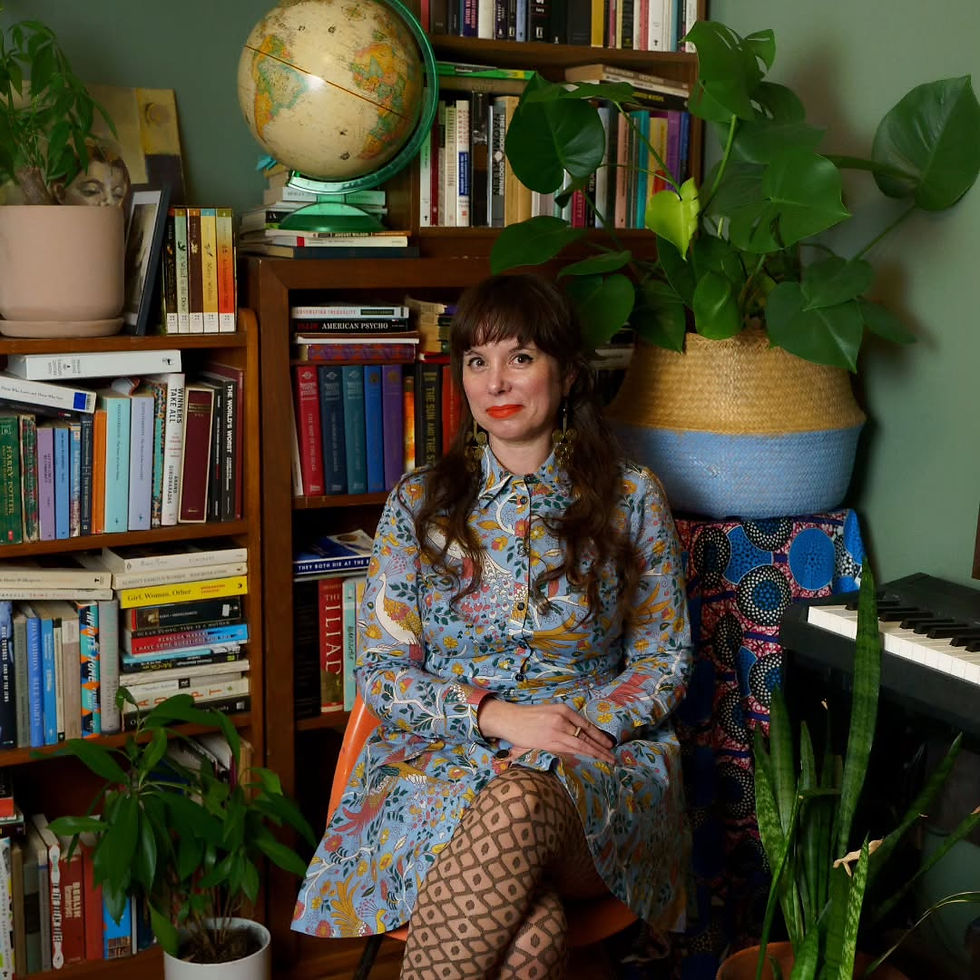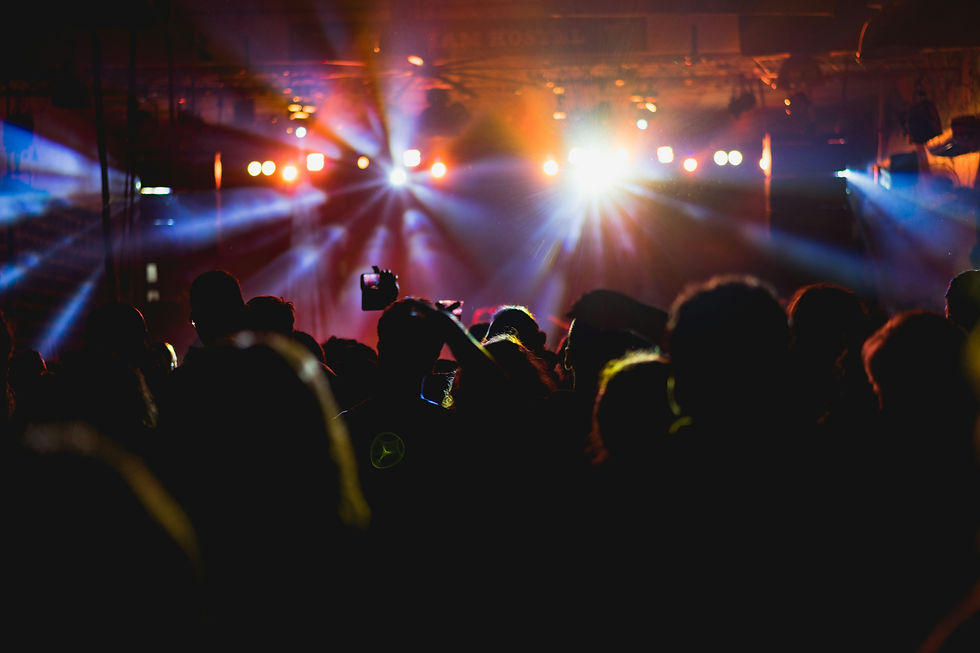Keeping the DIY Spirit Alive: Meet Katy Henriksen, the Music Cities Convention Master of Ceremonies
- Music Cities Events

- Sep 8, 2025
- 8 min read
Updated: Sep 9, 2025

“Fayetteville has a unique opportunity to celebrate its rich history
and blossom into a vibrant home for music of all kinds.”
Katy Henriksen, Cultural Journalist | Nonprofit Arts Leader | Strategic Communications & Media Expert
Katy Henriksen is a respected journalist, broadcaster, editor, and nonprofit arts and culture leader based in Fayetteville. Her work has appeared in some of the city’s most influential media outlets, and throughout her career, she has been dedicated to amplifying the voices and sounds that shape its cultural landscape. Meet the Music Cities Convention's Master of Ceremonies, who brings this deep local expertise to the global stage.
In conversation with Music Cities Events Magazine, ahead of the Music Cities Convention this September, Katy reflects on her roots in Fayetteville, the city’s evolving music and arts scene, and her mission to keep the soul of the city alive while fostering connections through music and storytelling.
Interview by Liliana Ramírez
Your career in journalism, broadcasting, and nonprofit arts is amazing, with work featured in outlets such as Salon, Hyperallergic, Bandcamp Daily, Oxford American, Publishers Weekly, The Brooklyn Rail, Maggot Brain, The Creative Independent, and many others. Anyway, your career began as a music journalist… how did the city of Fayetteville inspire or influence you in those early days?

“Fayetteville inspired me because that's where I first became a journalist. I have two degrees from the University of Arkansas in Fayetteville. My undergraduate degree is in print journalism. My master's is in journalism with an emphasis in gender studies and popular culture. When I was a student at the university, I was the features editor of the student newspaper, The Traveler. I also started a literary magazine called Exposure and went to a ton of house shows.
I grew up in Fayetteville. My grandfather was a music professor and, at some point, the chair of the music department. I've been surrounded by music since birth. In fact, I grew up playing ‘Chopsticks’ on my grandparents' harpsichord in their house on Markham Hill. My high school, Fayetteville High School, was also rich with arts and music. I sang in the choir and was in All-State Choir one year, as well as on the high school literary magazine staff.
I was steeped in art in music from the get-go and have incredibly fond memories of growing up in Fayetteville, attending classical concerts in the Fine Arts Building on campus, or going to an all-ages punk show at a skateboard shop downtown. My aim to this day is to continue to keep a DIY arts and music ethos alive and well for everyone to experience such a rich life”.
As a music and arts journalist, what do you think is the most exciting thing happening in Fayetteville’s music scene right now?
“To me, the most exciting thing happening now in Fayetteville for arts and culture is the insatiable hunger I feel from our community to continue to make truly vibrant and unique arts and live music events happen. Despite rising costs on all fronts, particularly in real estate prices, there are so many people working hard every day to make sure that art and music continue here. The population of Fayetteville has more than doubled since I graduated from high school in the 1990s. Northwest Arkansas is a much different place from the sleepy college town that I grew up in. Seeing that there is so much hunger and energy to ensure that the DIY spirit of my hometown is still here, despite all the changes, is beautiful. Fayetteville has a unique opportunity to celebrate its rich history and blossom into a vibrant home for music of all kinds”.
Currently, as editor of the Northwest Arkansas Democrat-Gazette, what do you consider to be the most important cultural or arts-related story in Fayetteville this year?

“I'm actually working on a story right now about the Folk School of Fayetteville. Depending on when you publish this interview, it may be out, and you could link to it! The hope is that the Folk School of Fayetteville will continue to operate with Ozark Folkways as the new operators, so that we can continue with a downtown space that caters to music and arts. Fayetteville has a distinct opportunity to support a rich arts and culture history that's been here and continues to evolve and grow. We have an amazing artistic community that deserves support. The passion I see here is incredible”.
Your show ‘Of Note’ on KUAF 91.3 NPR, which you hosted until 2019, is a unique platform for classical music and the arts. Do you think Fayetteville has a tradition of classical music? How do you make these subjects engaging for a broad and diverse audience?

“Ha! Well, considering that my grandfather was an oboist and classical music professor, I certainly know about our city's classical music history. My grandmother was a violist, and together my grandparents were early music scholars who collected early reed instruments and viola da gambas. I started playing violin in elementary school and by high school studied classical voice.
Because I've never known a world without Bach organ fugues, I wanted to show listeners that classical music is a living, breathing art form that everyone can enjoy. When I programmed Of Note, I made sure to play contemporary classical sounds by a diverse array of performers and composers to take the form away from the mold of dead white European men. That sometimes meant playing music by Yo-Yo Ma's Silk Road Ensemble or maybe Bela Fleck performing a banjo concerto with the Nashville Symphony Orchestra. Through my programming, I wanted to celebrate a wealth of sounds that expanded the boundaries of what 'classical music' could be."
Your podcast ‘Sound Off’ features in-depth conversations with Grammy winners, Pulitzer Prize winners, and other artists who are pushing the boundaries of sound. Who have been some of the most interesting personalities you’ve had the opportunity to interview for this project?
"It's a gift to be able to talk to composers and performers who are at the top of their game. In season one, I interviewed Caroline Shaw, who was the first woman to ever win a Pulitzer Prize for composition. This season, I interviewed Seun Kuti, who stepped into the shoes of his legendary father Fela, to become the bandleader for Egypt 80. I can't believe I have the opportunity to talk to such incredible forces in music."
What inspired you to create ‘The Trillium Salon Series’, a nonprofit project that is redefining the live music experience in Fayetteville for classical, new music, and experimental sounds?
“I started Trillium when I was at KUAF as an outreach effort because I heard so many listeners to ‘Of Note’ comment that they loved listening to my show but didn't know anything about classical music. I grew up in concert halls, so hearing live strings or other concert hall sounds was innate for me. I wanted to bring these sounds directly to the people, and I wanted to produce concerts that blurred the boundary between audience and performer to invite connection and build community.
Since launching the first concert in my living room, I've heard from countless people about the resonance and connection made through these types of concerts. I've heard from people who'd never heard a violin played live. I've introduced listeners to sounds they love that they may never have come across before. I know that people have become friends after meeting at a salon. The joy of facilitating such a connection and community is truly incredible”.
In your TED Talk, “How to Feel More Human by Connecting Through Music,” you explore music as an active and intimate experience. How have you personally experienced this kind of connection?
“Certainly - I've always had this sort of connection because of the rich, live music setting I was born into. Growing up, my mom was a pianist and bassist, and my sister was an oboe player. The house was never quiet! One, if not more of us, were always practicing music. I've grown up singing in choirs and playing in orchestras, and so I've been able to have this experience all my life. Connecting through the great resonance of music is like nothing else, and I want to help bring that resonance to everyone!”
Finally, if we were to follow a ‘music and culture’ route through Fayetteville, what would be your favorite stops, from venues and cafés to galleries and hidden gems?
“I'm biased, because I worked there through college, but Dickson Street Bookshop is a must. I also worked at The Strand in NYC, and Dickson Street Bookshop beats it any day. I did a documentary film about this magical bookshop when I was in grad school. It's the best bookshop in the world.
Pond Gallery, which opened just over a year ago, just off the downtown square, is a tiny 300-square-foot art gallery that always has amazing shows. Walk around the corner and grab a bite at another basement establishment, Hugos, and then pop in Block Street Records to comb through stacks of vinyl! Wander down the street to have a drink and play pinball at Pinpoint, then finish the night with a Bee's Knees at Maxines.
Regarding music, well, you have to see who's around and playing. The Faulkner Performing Arts Center on the university campus is a state-of-the-art facility. I've seen Vijay Iyer and Bill Frissell there! There may be someone at the Walton Arts Center or George's. The Fayetteville Public Library produces live music, too. I've had the opportunity to host Trillium concerts there. Likewise, Community, a co-working space downtown, is a great creative partner for Trillium. We've hosted live improv scoring to films like Nosferatu and Tatsuya Nakatani's gong orchestra in our first-floor galleries. One time, we even did a project where we asked the community to fold 1,000 cranes for peace and hung them as an installation there.
I prefer the very small and intimate shows produced by independent entities such as my organization, Trillium, or, say, On the Map - they've hosted music at Pearl's Books, for example, but also bring bigger acts to George's. Independent live music producers are also hosting shows at the American Legion now.

When I grew up, the first coffee shop in the entire city, the original Arsaga's, opened up on Block Street. Now we have so many! For Arsaga's, stop in Church & Center for fancy toasts and coffee, or for a full meal, head over to The Mill District Arsaga's, which also hosts artist exhibits. Ozark Natural Foods has a cafe with a beautiful outdoor patio. Sip on a matcha latte or maybe grab a Hazy IPA on draft from one of the local breweries”.
Fayetteville has always been steeped in music and art—from harpsichords on Markham Hill to punk shows in downtown skate shops. Today, the city stands at a crossroads: to honor that legacy while blossoming into a vibrant home for music of all kinds.
That’s the vision Katy Henriksen, cultural journalist, nonprofit arts leader, and lifelong Fayetteville resident, has carried throughout her career. From editing major publications to founding intimate concert experiences like the Trillium Salon Series, Katy has dedicated her life to keeping the DIY spirit alive and amplifying voices through music and storytelling.
At the Music Cities Convention in Fayetteville Arkansas this September 16–18, we’ll join Katy and a global community of artists, policymakers, and cultural leaders to explore how cities can nurture their own unique soundscapes while building inclusive cultural ecosystems.
Together, we’ll dive into the stories, celebrate grassroots innovation, and create practical blueprints for communities everywhere.
Ready to experience how music can connect, transform, and sustain cities?
Join us in Fayetteville, AR. Last tickets available at: musiccitiesevents.com/fayetteville-mcc-2025
Let’s build cities where music doesn’t just echo the past—it shapes the future.








Comments